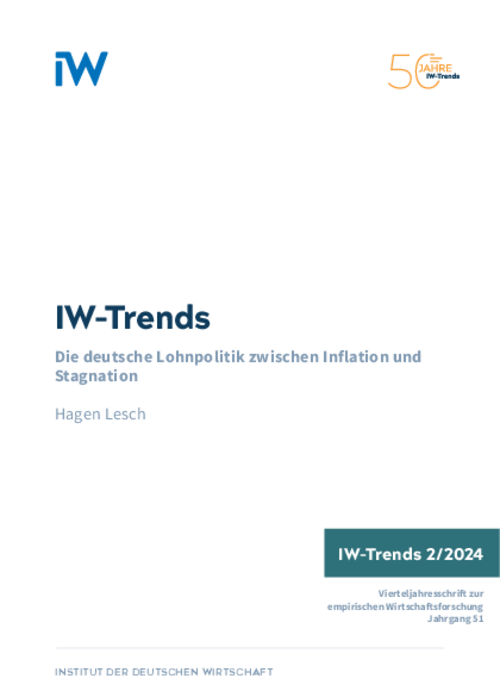After the economic and financial crisis of 2008/9, the German labour market soon began to recover, creating scope for a comparatively expansive wage policy.

German Wage Policy between Inflation and Stagnation: Are Conflicts with the Aims of Monetary Policy Looming?

After the economic and financial crisis of 2008/9, the German labour market soon began to recover, creating scope for a comparatively expansive wage policy.
However, this has primarily been reflected in the course of effective wages: While the pay negotiated in collective agreements has risen by a total of 37.7 per cent since 2010, actual gross wage payments have increased by 52.1 per cent. Effective wage growth has been particularly pronounced in the service sector, where the rise amounts to 54.2 per cent, while gross wages in the manufacturing sector have gone up by just 43.8 per cent. Thus a sustained wage drift has developed, especially in the service sector, leaving room for regional and skill differentials at company level. However, the rise in labour costs of just under 50 per cent in the country as a whole has clearly diverged from productivity growth, which was only 11.2 per cent in the same period. The country’s expansive wage policy has thus triggered a surge in costs which companies have passed on to their customers in the prices of their goods, a development particularly noticeable in the last two years. In view of the wage demands, often running into double digits, that are currently being made by trade unions, further wage cost increases loom this year, which may lead to conflicts with government monetary policy. On the other hand, since part of the current upward pressure on labour costs is temporary, based as it is on inflation compensation premiums that are exempt from tax and social security contributions, pressure to increase wages could ease from 2025.

German Wage Policy between Inflation and Stagnation: Are Conflicts with the Aims of Monetary Policy Looming?

More on the topic

A Macroeconomic Analysis of Wage-Price Spirals
The subject of this Analysis is the forms that wage-price spirals can take and how they influence macroeconomic stability and inflationary trends in Germany.
IW
The Energy Dependence of Bank Loans
Russia's war against Ukraine has highlighted the vulnerability of the Federal Republic of Germany to Russian energy imports, especially natural gas.
IW